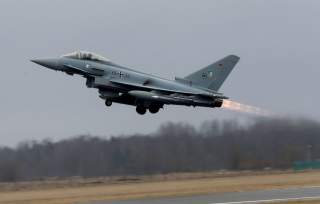A Germany F-35? Berlin Said "Nein."
What happened?
No timetable for a decision was given, but the process could take time since the U.S. government will have to certify both jets to carry the nuclear weapons. Germany has 85 operational Tornado jets, but not all are equipped to carry nuclear weapons.
Germany has further shortlisted the Eurofighter and the F/A-18 as potential candidates to replace its Tornado fighter-bomber, knocking Lockheed Martin’s F-35 stealth fighter out of a tender worth billions of euros, Defence Ministry sources told Reuters on Thursday.
The winner will have to be certified to carry U.S. nuclear weapons.
No timetable for a decision was given, but the process could take time since the U.S. government will have to certify both jets to carry the nuclear weapons. Germany has 85 operational Tornado jets, but not all are equipped to carry nuclear weapons.
The same sources revealed that the Luftwaffe (German Air Force) will also move ahead with long-awaited plans to replace its 33 oldest Eurofighter jets, now used mainly for air policing or training, with new, more capable Eurofighters in coming years.
That will translate into orders worth up to 3 billion euros ($3.4 billion) for Airbus, according to sources familiar with the issue.
In marketing the F/A-18, Boeing had underscored its high readiness rates, relatively low cost and strong electronic attack capabilities, arguments that resonated in military circles.
The decision marks a big setback for Lockheed, the top U.S. arms maker, which had hoped to add to recent F-35 sales to other European countries, including Belgium.
As reported, Germany’s air force chief of staff was fired last year after he expressed a clear preference for the F-35. The ministry later said it favored a “European solution.”
Military officials argue that the Tornadoes, which entered service in 1983, need urgent replacement due to rising maintenance costs. Sources familiar with the matter say it could cost around 8 billion euros to keep the planes flying past 2030.
Sources familiar with the process last year had said the ministry wanted to split the order between one of the two U.S. planes and the Eurofighter, which is built by Airbus, Britain’s BAE Systems and Italy’s Leonardo. But it now appears Berlin will pick just one winner.
Paris, Germany’s closest European partner, had warned that buying the F-35 in particular could derail plans to develop a new Franco-German fighter by 2040.
This article by Dario Leone originally appeared on The Aviation Geek Club in 2019.
Image: Reuters.

